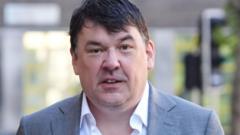Did Trans Activists Really Make Linehan's Life a Living Hell?

Published: 2025-09-05 15:18:04 | Category: technology
Graham Linehan, the co-creator of the iconic TV series "Father Ted," is currently facing serious legal allegations, including harassment and criminal damage, stemming from his outspoken views on transgender issues. The ongoing trial at Westminster Magistrates' Court has shed light on the contentious relationship between Linehan and transgender activists, particularly in the context of free speech and the impact of social media on personal interactions.
Last updated: 27 October 2023 (BST)
Key Takeaways
- Graham Linehan is accused of harassing Sophia Brooks, a transgender activist.
- The trial highlights the ongoing tension between free speech and activism in the context of gender identity.
- Linehan has pleaded not guilty to all charges, asserting that he is being targeted for his beliefs.
- The case raises questions about the role of social media in harassment and personal disputes.
- Linehan's legal troubles follow a previous arrest related to his comments on transgender individuals.
Background of the Case
The case against Graham Linehan has garnered significant media attention due to its implications for freedom of expression and the rights of transgender individuals. Linehan has been a vocal critic of transgender rights, leading to his classification by some as a controversial figure within the discourse on gender issues.
During the second day of his trial, Linehan testified that his life had been "made hell" due to the actions of transgender activists and journalists, claiming that he has faced relentless harassment for his views on gender identity. "Trans activists have spent the last 10 years demonising anyone who stands up to them," he stated, suggesting that his situation is part of a broader pattern of intimidation against dissenting voices.
The Allegations Against Linehan
The prosecution alleges that Linehan engaged in a campaign of harassment against Sophia Brooks, specifically targeting her on social media. According to the charges, he "relentlessly" posted derogatory comments about Brooks, labelling her a "deeply disturbed sociopath" and a "domestic terrorist." These comments were made in the context of Brooks' involvement in a protest against an LGB Alliance conference, where a disruptive incident involving live crickets occurred.
On 19 October 2022, Brooks confronted Linehan outside the Battle of Ideas conference in London, during which he allegedly assaulted her phone, damaging it in the process. The prosecution claims that his actions were not just impulsive but indicative of a pattern of oppressive behaviour, which they argue crossed the line into harassment.
Linehan's Defence
In response to the allegations, Linehan has maintained his innocence, arguing that his comments were justified and that he felt provoked by Brooks' persistent behaviour. He described the incident involving the phone as an "instinctive" reaction to what he perceived as harassment, stating, "I could see he was furious... then I threw the phone." This defence underscores a crucial aspect of the trial: the interpretation of intent and the context of social media interactions.
The Social Media Landscape
The role of social media in facilitating both communication and conflict is a central theme in this case. Linehan's comments on platforms such as X (formerly Twitter) have been pivotal in shaping public perceptions and have contributed to his notoriety. The prosecution claims that his online behaviour constitutes harassment, while Linehan argues that he is exercising his right to free speech.
This case reflects a larger societal debate about the boundaries of free expression, particularly concerning sensitive topics like gender identity. As social media continues to evolve, the legal ramifications of online interactions are becoming increasingly complex, raising questions about accountability and the potential for misuse of digital platforms.
Gender Identity and Activism
The trial also highlights the tensions between differing views on gender identity and the activism surrounding it. Linehan's assertions that "predatory men" can exploit the transgender rights movement resonate with some who share his views, though they are met with significant opposition from advocates for transgender rights. The legal system's handling of such cases is crucial in determining how these tensions will be navigated in the future.
Implications of the Trial
The implications of Linehan's trial extend beyond the courtroom. It raises pressing questions about the limits of free speech, particularly in the context of social media, where statements can rapidly escalate into public disputes. Furthermore, the outcome may influence future cases involving similar allegations, particularly those involving public figures and contentious social issues.
As the trial continues, observers are keenly watching how the court balances the rights of individuals to express their opinions with the need to protect vulnerable groups from harassment. The legal precedent set in this case could have lasting effects on the discourse surrounding gender identity, activism, and the role of social media in shaping public debates.
What’s Next for Linehan?
As the proceedings unfold, Linehan's legal team will likely focus on dismantling the prosecution's narrative, arguing that his actions were not intended to cause harm but rather a reaction to perceived harassment. The defence may also seek to contextualise his remarks within the framework of free speech, a critical point of contention in the trial.
Meanwhile, the public's response to the trial will play a significant role in shaping the narrative around Linehan and his views. The case has already sparked significant debate among both supporters and critics, illustrating the polarising nature of discussions surrounding transgender rights and free speech.
It remains to be seen how the court will rule and what implications the verdict will have for Linehan and his future. The outcome will undoubtedly resonate throughout the ongoing discussions about gender identity, activism, and the boundaries of acceptable public discourse.
FAQs
What are the charges against Graham Linehan?
Graham Linehan faces charges of harassment and criminal damage, primarily related to his interactions with transgender activist Sophia Brooks on social media and during a confrontation in October 2022.
How has Linehan defended his actions?
Linehan has pleaded not guilty, arguing that his comments were justified and that he reacted instinctively to perceived harassment from Brooks, claiming his actions were not intended to cause harm.
What is the significance of this trial?
The trial raises important questions about the balance between free speech and protection from harassment, especially in the context of social media interactions and the ongoing debates surrounding transgender rights.
What previous legal issues has Linehan faced?
Earlier this month, Linehan was arrested at Heathrow Airport on suspicion of inciting violence through his social media posts about transgender individuals, which has intensified public scrutiny of his views.
What are the implications of the trial for public discourse?
The outcome of the trial may set important legal precedents concerning free speech and harassment, impacting how individuals can discuss contentious topics without facing legal repercussions.



